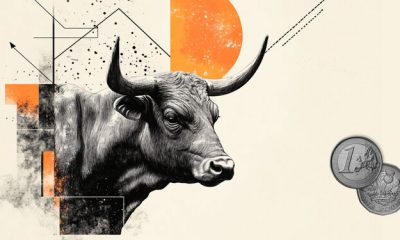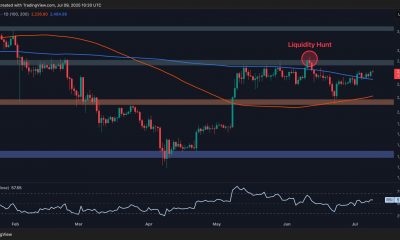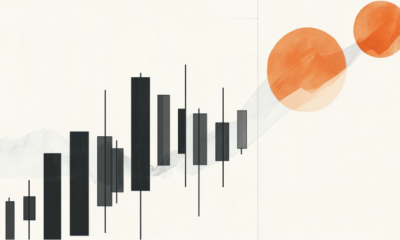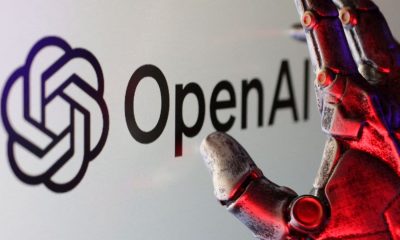

Metaverse
Your employer is (probably) unprepared for artificial intelligence – Crypto News
Speculation about the consequences of AI—for jobs, productivity and quality of life—is at fever pitch. The tech is awe-inspiring. And yet AI’s economic impact will be muted unless millions of firms beyond Silicon Valley adopt it. That would mean far more than using the odd chatbot. Instead, it would involve the full-scale reorganization of businesses and their in-house data. “The diffusion of technological improvements”, argues Nancy Stokey of the University of Chicago, “is arguably as critical as innovation for long-run growth.”
The importance of diffusion is illustrated by Japan and France. Japan is unusually innovative, producing on a per-person basis more patents a year than any country bar South Korea. Japanese researchers can take credit for the invention of the QR code, the lithium-ion battery and 3D printing. But the country does a poor job of spreading new tech across its economy. Tokyo is far more productive than the rest of the country. Cash still dominates. In the late 2010s only 47% of large firms used computers to manage supply chains, compared with 95% in New Zealand. According to our analysis, Japan is roughly 40% poorer than would be expected based on its innovation.
View Full Image
France is the opposite. Although its record on innovation is average, it is excellent at spreading knowledge across the economy. In the 18th century French spies stole engineering secrets from Britain’s navy. In the early 20th century Louis Renault visited Henry Ford in America, learning the secrets of the car industry. More recently, former AI experts at Meta and Google founded Mistral AI in Paris. France also tends to do a good job of spreading new tech from the capital to its periphery. Today the productivity gap in France between a top and a middling firm is less than half as big as in Britain.
During the 19th and 20th centuries businesses around the world became more “French,” with new technologies diffusing ever faster. Diego Comin and Martí Mestieri, two economists, find evidence that “cross-country differences in adoption lags have narrowed over the last 200 years .” Electricity swept across the economy faster than tractors. It took just a couple of decades for personal computing in the office to cross the 50% adoption threshold. The internet spread even faster. Overall, the diffusion of technology helped propel productivity growth during the 20th century.
Since the mid-2000s, however, the world has been turning Japanese. True, consumers adopt technology faster than ever. According to one estimate TikTok, a social-media app, went from zero to 100m users in a year. ChatGPT itself was the fastest-growing web app in history until Threads, a rival to Twitter, launched this month. But businesses are increasingly cautious. In the past two decades all sorts of mind-blowing innovations have come to market. Even so, according to the latest official estimates, in 2020 just 1.6% of American firms employed machine learning. In America’s manufacturing sector only 6.7% of companies make use of 3D printing. Only 25% of business workflows are on the cloud, a number that hasn’t budged in half a decade.
Horror stories abound. In 2017 a third of Japanese regional banks still used COBOL, a programming language invented a decade before man landed on the moon. Last year Britain imported more than £20m-($24m-) worth of floppy disks, MiniDiscs and cassettes. A fifth of rich-world firms do not even have a website. Governments are often the worst offenders—insisting, for instance, on paper forms. We estimate that bureaucracies across the world spend $6bn a year on paper and printing, about as much in real terms as in the mid-1990s.
Best and the rest
The result is a two-tier economy. Firms that embrace tech are pulling away from the competition. In 2010 the average worker at Britain’s most productive firms produced goods and services worth £98,000 (in today’s money), which had risen to £108,500 by 2019. Those at the worst firms saw no rise. In Canada in the 1990s frontier firms’ productivity growth was about 40% higher than non-frontier firms. From 2000 to 2015 it was thrice as high. A book by Tim Koller of McKinsey, a consultancy, and colleagues finds that, after ranking firms according to their return on invested capital, the 75th percentile had a return 20 percentage points higher than the median in 2017—double the gap in 2000. companies see huge gains from buying new tech; many see none at all.

View Full Image
Although the economics may sound abstract, the real-world consequences are crushingly familiar. People stuck using old technologies suffer, along with their salaries. In Britain, average wages at the least productive 10% of firms have fallen slightly since the 1990s—even as average wages at the best firms have risen strongly. According to Jan De Loecker of KU Leuven and colleagues, “the majority of inequality growth across workers is due to increasing average wage differences between firms”. What, then, has gone wrong?
Three possibilities explain lower diffusion: the nature of new technology, sluggish competition, and increasing regulation. Robert Gordon of Northwestern University has argued that the “great inventions” of the 19th and 20th centuries had a far bigger impact on productivity than more recent ones. The problem is that as technological progress becomes more incremental, diffusion also slows, since companies have less incentive and face less competitive pressure to upgrade. Electricity provided light and energy to power machines. Cloud computing, by contrast, is needed only for the most intensive operations. Newer innovations, like machine-learning, may be trickier to use, requiring more skilled workers and better management.

View Full Image
Business dynamism fell across the rich world in the first decades of the 21st century. Population aged. Fewer new firms were set up. Workers moved companies less frequently. All this reduced diffusion, since workers spread tech and business practices as they move across the economy.
In industries run or heavily managed by the government, technological change happens slowly. As Jeffrey Ding of George Washington University notes, in the centrally planned Soviet Union innovation was world-beating—think of Sputnik—but diffusion was non-existent. The absence of competitive pressure blunted incentives to improve. Politicians often have public-policy goals, such as maximizing employment, that are inconsistent with efficiency. Heavily regulated industries make up a large chunk of Western economies today: such sectors, including construction, education, health care and utilities, account for a quarter of American GDP.
Could AI break the mould, diffusing across the economy faster than other recent technologies? Maybe. For almost any firm it is easy to dream up a use-case. No more administration! A tool to file my taxes! Covid-19 may also have injected a dose of dynamism into Western economies. New firms are being set up at the fastest pace in a decade, and workers are swapping jobs more often. Tyler Cowen of George Mason University adds that weaker firms may have a particular incentive to adopt AI, because they have more to gain.
AI can also be built into existing tools. Many coders—maybe most—already use AI on a daily basis owing to its integration into everyday coding instruments through Github’s CoPilot. Word processors, including Microsoft Word and Google Docs, will soon roll out dozens of AI features.
not a dinner party
On the other hand, the biggest benefits from new forms of AI will come when firms entirely reorganize themselves around the new technology; by adapting AI models for in-house data, for example. That will take time, money and, crucially, a competitive drive. Gathering data is tiresome and running the best models fearfully expensive—a single complex query on the latest version of ChatGPT can cost $1-2. Run 20 in an hour and you have passed the median hourly American wage.
These costs will fall, but it could take years for the technology to become sufficiently cheap for mass deployment. Bosses, worried about privacy and security, regularly tell The Economist that they are unwilling to send their data to modify models that live elsewhere. Surveys of small businesses are not encouraging. One, by GoDaddy, a web-hosting company, suggests that around 40% of those in America are uninterested in AI tools. The technology is undoubtedly revolutionary. But are businesses ready for a revolution?
© 2023, The Economist Newspaper Limited. All rights reserved. From The Economist, published under license. The original content can be found on www.economist.com
-
others1 week ago
Will Ethereum Price Rally to $3,200 as Wall Street Pivots from BTC to ETH – Crypto News
-
![DIS Elliott Wave technical analysis [Video]](https://dripp.zone/news/wp-content/uploads/2025/06/DIS-Elliott-Wave-technical-analysis-Video-Crypto-News-400x240.jpg)
![DIS Elliott Wave technical analysis [Video]](https://dripp.zone/news/wp-content/uploads/2025/06/DIS-Elliott-Wave-technical-analysis-Video-Crypto-News-80x80.jpg) others7 days ago
others7 days agoSkies are clearing for Delta as stock soars 13% on earnings beat – Crypto News
-
![DIS Elliott Wave technical analysis [Video]](https://dripp.zone/news/wp-content/uploads/2025/06/DIS-Elliott-Wave-technical-analysis-Video-Crypto-News-400x240.jpg)
![DIS Elliott Wave technical analysis [Video]](https://dripp.zone/news/wp-content/uploads/2025/06/DIS-Elliott-Wave-technical-analysis-Video-Crypto-News-80x80.jpg) others7 days ago
others7 days agoSkies are clearing for Delta as stock soars 13% on earnings beat – Crypto News
-

 Blockchain1 week ago
Blockchain1 week agoInsomnia Labs Debuts Stablecoin Credit Platform for Creators – Crypto News
-

 Blockchain1 week ago
Blockchain1 week agoEU Questions Robinhood About OpenAI and SpaceX Stock Tokens – Crypto News
-

 others1 week ago
others1 week agoAppropriate to have cautious gradual stance on easing – Crypto News
-

 Cryptocurrency1 week ago
Cryptocurrency1 week agoTornado Cash Judge Won’t Let One Case Be Mentioned in Roman Storm’s Trial: Here’s Why – Crypto News
-

 Blockchain1 week ago
Blockchain1 week agoKraken and Backed Expand Tokenized Equities to BNB Chain – Crypto News
-
Business1 week ago
Did Ripple Really Win XRP Lawsuit Despite $125M Fine? Lawyer Fires Back at CEO – Crypto News
-

 others1 week ago
others1 week agoEUR/GBP posts modest gain above 0.8600 ahead of German inflation data – Crypto News
-

 Blockchain1 week ago
Blockchain1 week agoAnt Group Eyes USDC Integration Circle’s: Report – Crypto News
-

 Cryptocurrency7 days ago
Cryptocurrency7 days agoBitcoin Breaks New Record at $111K, What’s Fueling the $120K Price Target? – Crypto News
-
Technology7 days ago
XRP Eyes $3 Breakout Amid Rising BlackRock ETF Speculation – Crypto News
-
Business1 week ago
Solana ETF Launch Delayed Amid Wait for SEC’s Crypto ETF Framework – Crypto News
-

 others1 week ago
others1 week agoUSD/CHF gains ground below 0.8000 ahead of US tariff deadline – Crypto News
-

 Cryptocurrency1 week ago
Cryptocurrency1 week agoOn thinking ahead when markets get murky – Crypto News
-
Technology1 week ago
Solana Meme Coin PNUT Rallies 10% Amid Elon Musk’s Statement – Crypto News
-

 Cryptocurrency1 week ago
Cryptocurrency1 week agoIs ETH Finally Ready to Shoot For $3K? (Ethereum Price Analysis) – Crypto News
-

 Blockchain1 week ago
Blockchain1 week agoXRP Rally Possible If Senate Web3 Crypto Summit Goes Well – Crypto News
-

 others1 week ago
others1 week agoUSD/CAD trades with positive bias below 1.3700; looks to FOMC minutes for fresh impetus – Crypto News
-

 Blockchain1 week ago
Blockchain1 week agoEthereum Bulls Roar — $3K Beckons After 5% Spike – Crypto News
-
Technology1 week ago
VC Firm Ego Death Capital Closes $100M Funding to Back Bitcoin-Based Projects – Crypto News
-

 others1 week ago
others1 week agoNovaEx Launches with a Security-First Crypto Trading Platform Offering Deep Liquidity and Institutional-Grade Infrastructure – Crypto News
-

 Cryptocurrency1 week ago
Cryptocurrency1 week agoXRP price forecast as coins surges 2.19% to $2.33 – Crypto News
-

 others7 days ago
others7 days agoAnthony Scaramucci Says $180,000 Bitcoin Price Explosion Possible As BTC ‘Supremacy’ Creeps Up – Here’s His Timeline – Crypto News
-

 Blockchain7 days ago
Blockchain7 days agoSUI Chart Pattern Confirmation Sets $3.89 Price Target – Crypto News
-

 others6 days ago
others6 days agoEUR/GBP climbs as weak UK data fuels BoE rate cut speculation – Crypto News
-

 Blockchain6 days ago
Blockchain6 days agoBitcoin Hits All-Time High as Crypto Legislation Votes Near – Crypto News
-
Business6 days ago
PENGU Rallies Over 20% Amid Coinbase’s Pudgy Penguins PFP Frenzy – Crypto News
-

 Blockchain4 days ago
Blockchain4 days agoRobinhood Dealing With Fallout of Tokenized Equities Offering – Crypto News
-
others1 week ago
Nasdaq-Listed Bit Digital Converts Entire Bitcoin Holdings To Ethereum Treasury – Crypto News
-

 others1 week ago
others1 week agoEthereum Continues Outperforming Institutional Capital Flows As Investors Pour $1,040,000,000 Into Crypto Products: CoinShares – Crypto News
-

 Cryptocurrency1 week ago
Cryptocurrency1 week agoElon Musk announces his ‘America Party’ will embrace Bitcoin, criticizes Trump’s fiscal bill – Crypto News
-

 Technology1 week ago
Technology1 week agoHuaweis AI lab denies that one of its Pangu models copied Alibabas Qwen – Crypto News
-

 Cryptocurrency1 week ago
Cryptocurrency1 week agoXRP could rally higher on steady capital inflow; check forecast – Crypto News
-

 Blockchain1 week ago
Blockchain1 week agoVitalik Buterin Backs Copyleft Licensing for Fairer Crypto – Crypto News
-

 Cryptocurrency1 week ago
Cryptocurrency1 week agoBulls In Control But Resistance Persists at $2.30. What Next? – Crypto News
-
Technology1 week ago
GameSquare Stock Shoots 58% After Revealing $100 Million Ethereum Treasury Strategy – Crypto News
-

 others1 week ago
others1 week agoAustralian Dollar remains stronger due to persistent inflation risks, FOMC Minutes eyed – Crypto News
-

 others1 week ago
others1 week agoUS Dollar Resurgence May Be Around the Corner, According to Barclays Currency Strategist – Here’s Why: Report – Crypto News
-
others1 week ago
Trump Jr. Backed Thumzup Media To Invest In ETH, XRP, SOL, DOGE And LTC – Crypto News
-

 Technology1 week ago
Technology1 week agoGoogle’s worst nightmare? OpenAI’s new AI web browser is coming soon to challenge Chrome – Crypto News
-

 Cryptocurrency1 week ago
Cryptocurrency1 week agoBitcoin Hits Record Peak. How High Can It Surge in 2025? – Crypto News
-

 Blockchain1 week ago
Blockchain1 week agoBinance Founder Backs BNB Treasury Company Aiming For US IPO – Crypto News
-
Cryptocurrency1 week ago
Tokenized Securities Are Still Securities, US SEC Warns Robinhood, Kraken – Crypto News
-

 Technology1 week ago
Technology1 week ago10 Smartchoice tablets from top brands, curated for everyday use, up to 45% off before Amazon Prime Day Sale – Crypto News
-

 Blockchain1 week ago
Blockchain1 week agoAustralia Banks Join Digital Currency Trial for Tokenized Assets – Crypto News
-
others1 week ago
China’s Ant Group With 1.4B Users Taps Circle to Integrate USDC – Crypto News
-

 Metaverse1 week ago
Metaverse1 week agoHow Brands Can Deepen Customer Connections in the Metaverse – Crypto News
-

 Technology7 days ago
Technology7 days agoPerplexity launches Comet, an AI-powered browser to challenge Google Chrome; OpenAI expected to enter the space soon – Crypto News


















